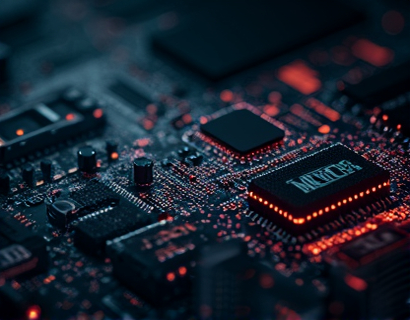Smart Contract Automation: Revolutionizing Business Payment Management
In the rapidly evolving landscape of financial technology, smart contract automation stands out as a transformative force, particularly in the realm of business payment management. This innovative approach leverages the inherent properties of blockchain technology to automate, secure, and streamline financial transactions, offering businesses a robust solution for managing dividends, earnings, and scheduled payments. By harnessing smart contracts, companies can significantly enhance operational efficiency and security, ensuring that financial processes are not only reliable but also transparent.
Understanding Smart Contracts
Before delving into the specifics of how smart contract automation revolutionizes business payment management, it's essential to understand what smart contracts are. A smart contract is a self-executing contract with the terms of the agreement directly written into code. These contracts run on a blockchain, a decentralized ledger that records all transactions across a network of computers. The code defines the rules and conditions that must be met for the contract to execute, ensuring that all parties adhere to the agreed terms without the need for intermediaries.
One of the key advantages of smart contracts is their immutability. Once deployed, the terms of a smart contract cannot be altered, providing a high level of security and trust. This characteristic is particularly valuable in financial transactions where trust and transparency are paramount. Smart contracts eliminate the risk of human error and fraud, as the execution of the contract is based solely on predefined conditions.
Automating Dividend and Earnings Distribution
One of the most impactful applications of smart contract automation is in the distribution of dividends and earnings. Traditionally, the process of distributing dividends involves multiple steps, including calculation, approval, and payment. Each step is prone to delays, errors, and increased administrative costs. With smart contracts, these processes can be automated, ensuring that dividends are distributed promptly and accurately.
For instance, a company can program a smart contract to automatically calculate and distribute dividends to shareholders based on predefined criteria, such as the number of shares owned and the profitability of the company. Once the conditions are met, the smart contract executes the payment without the need for manual intervention. This not only speeds up the process but also reduces the risk of errors and discrepancies.
Enhancing Security and Transparency
Security and transparency are critical components of any financial transaction, and smart contract automation excels in both areas. The decentralized nature of blockchain ensures that transaction records are immutable and tamper-proof. Each transaction is verified by multiple nodes in the network, making it extremely difficult for any single entity to manipulate the system.
Transparency is another significant benefit. All transactions recorded on a blockchain are visible to all participants, providing a clear and auditable trail. This level of transparency builds trust among stakeholders, as they can verify the accuracy and integrity of the transactions. For shareholders, this means greater confidence in the distribution process, knowing that their dividends are being handled securely and transparently.
Streamlining Scheduled Payments
Beyond dividends and earnings, smart contract automation can also revolutionize the management of scheduled payments. Whether it's salaries, rent, or other recurring expenses, smart contracts can automate these payments, ensuring they are made on time and in full. This is particularly beneficial for businesses with a large number of payees or complex payment schedules.
For example, a company can set up a smart contract to automatically transfer funds to suppliers on specific dates each month. The contract would check the predefined conditions, such as the due date and the amount to be paid, and execute the transfer once all criteria are met. This automation reduces the administrative burden and ensures that payments are consistent and reliable.
Reducing Costs and Increasing Efficiency
The automation of financial processes through smart contracts leads to significant cost savings and increased efficiency. By eliminating the need for intermediaries such as banks and payment processors, businesses can reduce transaction fees and processing times. Smart contracts operate on a peer-to-peer basis, directly between the parties involved, which further cuts down on costs.
Moreover, the automation of routine tasks frees up resources, allowing employees to focus on more strategic and value-adding activities. This not only improves operational efficiency but also enhances the overall productivity of the organization. In an environment where time and resources are valuable assets, smart contract automation provides a competitive edge.
Case Studies and Real-World Applications
Several companies have already begun to leverage smart contract technology for financial management, achieving notable success. For instance, a major multinational corporation implemented a smart contract-based system for distributing bonuses to employees. The smart contract automatically calculated the bonus amounts based on performance metrics and transferred the funds directly to the employees' bank accounts within hours of the evaluation period ending. This approach not only accelerated the payment process but also minimized the risk of errors and disputes.
In the realm of dividend distribution, a publicly traded company used smart contracts to automate the annual dividend payout. The smart contract was programmed to verify the number of outstanding shares and the company's profitability before executing the payments. Shareholders received their dividends within a day of the board's approval, a significant improvement over the traditional month-long process.
Challenges and Considerations
While the benefits of smart contract automation are clear, there are several challenges and considerations that businesses should be aware of. One of the primary concerns is the technical complexity of implementing smart contracts. Developing and deploying smart contracts requires a solid understanding of blockchain technology and programming skills. Companies may need to invest in training or hire specialized talent to ensure successful implementation.
Another consideration is the regulatory environment. As blockchain and smart contracts are relatively new, regulations vary by jurisdiction. Businesses must navigate these regulations to ensure compliance and avoid legal issues. It's crucial to stay informed about the evolving regulatory landscape and adapt accordingly.
Interoperability is another challenge. Different blockchain platforms may have varying protocols and standards, making it difficult for smart contracts to interact seamlessly across different systems. However, efforts are underway to develop cross-platform solutions, which will enhance the versatility and adoption of smart contracts.
Future Prospects
The future of smart contract automation in business payment management looks promising. As blockchain technology continues to mature, we can expect more robust and user-friendly platforms to emerge. The development of more advanced programming languages and tools will make it easier for businesses to create and deploy smart contracts without extensive technical expertise.
Additionally, the integration of smart contracts with other fintech solutions, such as artificial intelligence and machine learning, will further enhance their capabilities. For example, AI can be used to predict financial trends and optimize payment schedules, making the financial management process even more efficient and effective.
In conclusion, smart contract automation offers a revolutionary approach to business payment management, providing enhanced efficiency, security, and transparency. By automating the distribution of dividends, earnings, and scheduled payments, businesses can streamline their financial processes, reduce costs, and build greater trust with stakeholders. As the technology continues to evolve, the potential for innovation and improvement in financial management is vast.











































